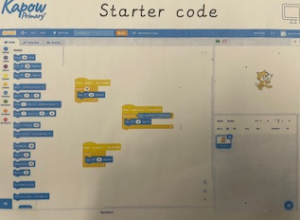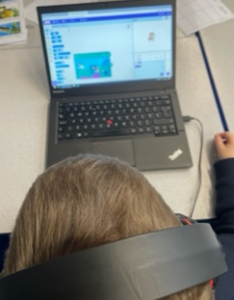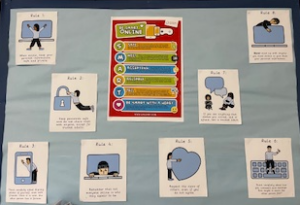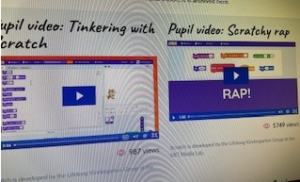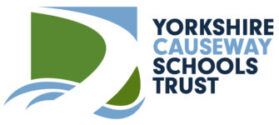Subject Leader
The subject leader for Computing is Miss Fishburn.
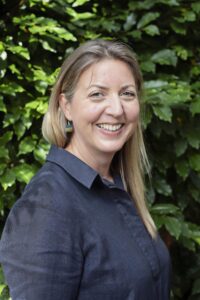
Miss Fishburn
They can be contacted by emailing admin@stpeters.ycway.uk using the subject title FAO of followed by the name of the subject leader. Emails typically receive a reply within 2-3 working days. Please note most of our subject leaders have a full-time teaching commitment.
With oversight and support from our Senior Leadership team subject leaders oversee and monitor the intent, implementation and impact of their subject.
Curriculum Development
Intent – The ambition and principles of our curriculum for our children. The curriculum content we expect children to learn. What we expect children to know. There is additional information on our intent – link to intent page
Implementation – How the intentions are realised. The sequence and strategies used to ensure children know and remember more. There is additional information on our curriculum page.
Impact – How we check and see if children know what we expect them to and how we help them further if needed. How knowledge and skills learnt improved and enriches their lives socially, emotionally, spiritually as well as academically.
Subject Rationale
Computing at St Peter’s supports children in becoming secure, and fluent in the identified agreed core knowledge and skills in Computing to enable them to develop their digital literacy. This is demonstrated through practical, cross-curricular teaching and learning of the National Curriculum for Computing. The computing curriculum at St Peters has been devised in conjunction with Kapow Primary schemes of work. It is also additionally supported by the PSHE Association, with specific links to developing and maintaining healthy relationships both on and offline. By the time children reach the end of Year Six they will have developed a secure Computing understanding and will be working in line with age related national expectations.
At St Peter’s the journey to becoming computing literate begins in the Early Years. The distinct section on Technology has been removed from the new Early Years framework, on the understanding that children now have very high levels of access to technologies such as phones and tablets. Computing is understood as a way that children may record and develop their play, and thinking, switching fluidly between first hand and on-screen experiences. In Early Years, children are provided with opportunities to support the 2020 Development Matters Guidance, and we work closely with parents to understand the opportunities children have at home to access technology and different forms of computing. Children will continue to build on their prior learning from being the youngest in school, to the oldest through formative assessments such as quizzes, activities, and recall assessments to ensure the learning is embedded in their long-term memory to ensure their learning journey does not stop with us as they continue to KS3.
Related Development Matters Learning
Communication and Language
Personal, Social and Emotional Development
Full Subject Rationale Computing
Subject Sequence and Knowledge Progression
The documents below outline in more detail the sequence children will follow in relation to Computing and the progression of knowledge. The computing curriculum at St Peters has been devised in conjunction with Kapow Primary schemes of work. It is also additionally supported by the PSHE Association, with specific links to developing and maintaining healthy relationships both on and offline.
Curriculum Subject Overview – Computing

Knowledge Organisers Examples
To help children secure the intended knowledge we are developing a range of child friendly knowledge organisers to support our curriculum implementation. Some examples are attached below.
Y5&6 Databases Knowledge Organiser
Computing Y4&5 Journey inside a Computer Knowledge Organiser
Impact Examples
We are pleased to share some examples of how knowledge and skills learnt have improved and enriched our children’s lives socially, emotionally, spiritually as well as academically.
Our children experience opportunities to carry out practical activities in Computing that help them to develop and build upon their knowledge and skills from EYFS to Year 6.
| Who? | What do we think of computing at St Peter’s? | Do you think we are online safety aware? |
| UKS2 Pupil | I really enjoy the sessions, especially coding and using scratch. I go home and continue it too! | We have online safety sessions quite often and also learn about it in assemblies as it’s so important. |
| LKS2 Pupil | Using the laptops is awesome! I liked the Scratch block as we got to learn lots more skills with the characters and setting. | We are very good at online safety and have a display in our classroom in case we forget. |
What have we been up to?
KS2 have been Online Safety Warriors and are building upon their knowledge of programming and algorithms using scratch, as part of our new teaching scheme KAPOW!
KS1 are going to be learning about Computer Systems and Networks and how to type. They will also be having online safety sessions, as well as accessing KAPOW!
EYFS are provides opportunities to support the 2020 Development Matters Guidance, and we work closely with parents to understand the opportunities children have at home. The main focus is on communication and language, as well personal, social and emotional development specifically online safety.
Curriculum Enrichment & Partnerships
Through the YCST Computing network we are pleased to work in partnership with the other schools in our Trust; sharing planning and ideas to contribute to providing an ambitious education.
